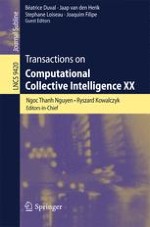2015 | OriginalPaper | Chapter
Strategic Negotiation and Trust in Diplomacy – The DipBlue Approach
Authors : André Ferreira, Henrique Lopes Cardoso, Luís Paulo Reis
Published in: Transactions on Computational Collective Intelligence XX
Publisher: Springer International Publishing
Activate our intelligent search to find suitable subject content or patents.
Select sections of text to find matching patents with Artificial Intelligence. powered by
Select sections of text to find additional relevant content using AI-assisted search. powered by
